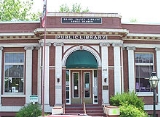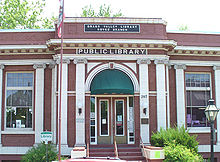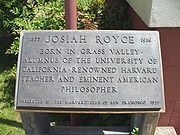
Josiah Royce
Encyclopedia
Josiah Royce was an American objective idealist
philosopher.
, grew up in pioneer California very soon after the California Gold Rush
. He received the B.A.
from the University of California, Berkeley
(at that time located in Oakland) in 1875 where he also accepted an instructorship teaching English composition, literature, and rhetoric. After some time in Germany, where he came to admire Hermann Lotze, the new Johns Hopkins University
awarded him in 1878 one of its first four doctorates, in philosophy
. He taught a course on the history of German thought, which was “one of his chief interests” because he was able to give consideration to the philosophy of history (Pomeroy, 6). He then taught philosophy, first at the University of California, Berkeley
, then at Harvard from 1882 until his death, thanks to the good offices of William James
, who was at once Royce's friend and philosophical antagonist.
Royce stands out starkly in the philosophical crowd because he was the only major American philosopher who spent a significant period of his life studying and writing history, specifically of the American West, “As one of the four giants in American philosophy of his time […] Royce overshadowed himself as historian, in both reputation and output” (Pomeroy, 2). During his first three years at Harvard, Royce taught many different subjects such as English composition, forensics, psychology and philosophy for other professors. He finally received a position as a professor in 1892. During this time he suffered a breakdown and took a semester off during which he did most of his historical writing (Pomeroy, 3).
 Clendenning (1999) is the standard biography. Autobiographical remarks by Royce can be found at Oppenheim (2001).
Clendenning (1999) is the standard biography. Autobiographical remarks by Royce can be found at Oppenheim (2001).
In 1883 he was approached by a publishing company who asked him to write the state history of California, “In view of his precarious circumstances at Harvard and his desire to pursue the philosophical work for which he had come east, Royce found the prospect attractive […]. He wrote to a friend that he was ‘tempted by the money’” (Pomeroy 3). Royce viewed the task as a side project, which he could use to fill his free time. Royce spent a significant period of time writing histories of California, enjoying it so much that he began to write novels set in California in which he was able to include his philosophical ideas. The books were considered to be “the fictional counterpart to his history, in which he developed similar philosophical themes” (Pomeroy, 5). In 1891 his historical writing career came to an end, but not before he had published several novels, reviews of California’s historical volumes, and articles in journals.
and Hibbert
lectures series respectively. The heart of Royce's idealist
philosophy was his contention that the apparently external world has real existence only as known by an ideal Knower, and that this Knower must be actual rather than merely hypothetical. He offered various arguments for this contention in both of his major works. He appears never to have repudiated this view, even though his later works are largely devoted to expositing his philosophy of community
.
 Two key influences on the thought of Royce were Charles Sanders Peirce and William James
Two key influences on the thought of Royce were Charles Sanders Peirce and William James
. In fact, it can be argued that a major way Peirce's ideas entered the American academy is through Royce's teaching and writing, and eventually that of his students. Peirce also reviewed Royce's The Religious Aspect of Philosophy (1885). Some have claimed that Peirce also supervised Royce's Ph.D., but that is impossible as Peirce arrived at Johns Hopkins in 1879.
Royce is also perhaps the founder of the Harvard school of logic, Boolean algebra, and foundation of mathematics. His logic, philosophy of logic
, and philosophy of mathematics
were influenced by Charles Peirce and Alfred Bray Kempe. Students who in turn learned logic at Royce's feet include Clarence Irving Lewis
, who went on to pioneer modal logic, Edward Vermilye Huntington
, the first to axiomatize Boolean algebra, and Henry M. Sheffer
, known for his eponymous stroke
. Much of Royce's writings on logic and mathematics, reminiscent in some ways of Bertrand Russell
's much better known Principia Mathematica, and on scientific method, are reproduced in Royce (1951, 1961).
In recent decades, Royce appears not to have attracted as much attention as other now-classic American philosophers, such as Peirce, John Dewey
, and his Harvard colleagues William James
, and George Santayana
. Philosophers influenced by Royce include Brand Blanshard
in the United States
and Timothy L.S. Sprigge in the United Kingdom
.
Objective idealism
Objective idealism is an idealistic metaphysics that postulates that there is in an important sense only one perceiver, and that this perceiver is one with that which is perceived. One important advocate of such a metaphysics, Josiah Royce, wrote that he was indifferent "whether anybody calls all...
philosopher.
Life
Royce, born in Grass Valley, CaliforniaGrass Valley, California
-2010:The 2010 United States Census reported that Grass Valley had a population of 12,860. The population density was 2,711.3 people per square mile . The racial makeup of Grass Valley was 11,493 White, 46 African American, 208 Native American, 188 Asian, 9 Pacific Islander, 419 from other...
, grew up in pioneer California very soon after the California Gold Rush
California Gold Rush
The California Gold Rush began on January 24, 1848, when gold was found by James W. Marshall at Sutter's Mill in Coloma, California. The first to hear confirmed information of the gold rush were the people in Oregon, the Sandwich Islands , and Latin America, who were the first to start flocking to...
. He received the B.A.
Bachelor of Arts
A Bachelor of Arts , from the Latin artium baccalaureus, is a bachelor's degree awarded for an undergraduate course or program in either the liberal arts, the sciences, or both...
from the University of California, Berkeley
University of California, Berkeley
The University of California, Berkeley , is a teaching and research university established in 1868 and located in Berkeley, California, USA...
(at that time located in Oakland) in 1875 where he also accepted an instructorship teaching English composition, literature, and rhetoric. After some time in Germany, where he came to admire Hermann Lotze, the new Johns Hopkins University
Johns Hopkins University
The Johns Hopkins University, commonly referred to as Johns Hopkins, JHU, or simply Hopkins, is a private research university based in Baltimore, Maryland, United States...
awarded him in 1878 one of its first four doctorates, in philosophy
Philosophy
Philosophy is the study of general and fundamental problems, such as those connected with existence, knowledge, values, reason, mind, and language. Philosophy is distinguished from other ways of addressing such problems by its critical, generally systematic approach and its reliance on rational...
. He taught a course on the history of German thought, which was “one of his chief interests” because he was able to give consideration to the philosophy of history (Pomeroy, 6). He then taught philosophy, first at the University of California, Berkeley
University of California, Berkeley
The University of California, Berkeley , is a teaching and research university established in 1868 and located in Berkeley, California, USA...
, then at Harvard from 1882 until his death, thanks to the good offices of William James
William James
William James was a pioneering American psychologist and philosopher who was trained as a physician. He wrote influential books on the young science of psychology, educational psychology, psychology of religious experience and mysticism, and on the philosophy of pragmatism...
, who was at once Royce's friend and philosophical antagonist.
Royce stands out starkly in the philosophical crowd because he was the only major American philosopher who spent a significant period of his life studying and writing history, specifically of the American West, “As one of the four giants in American philosophy of his time […] Royce overshadowed himself as historian, in both reputation and output” (Pomeroy, 2). During his first three years at Harvard, Royce taught many different subjects such as English composition, forensics, psychology and philosophy for other professors. He finally received a position as a professor in 1892. During this time he suffered a breakdown and took a semester off during which he did most of his historical writing (Pomeroy, 3).

In 1883 he was approached by a publishing company who asked him to write the state history of California, “In view of his precarious circumstances at Harvard and his desire to pursue the philosophical work for which he had come east, Royce found the prospect attractive […]. He wrote to a friend that he was ‘tempted by the money’” (Pomeroy 3). Royce viewed the task as a side project, which he could use to fill his free time. Royce spent a significant period of time writing histories of California, enjoying it so much that he began to write novels set in California in which he was able to include his philosophical ideas. The books were considered to be “the fictional counterpart to his history, in which he developed similar philosophical themes” (Pomeroy, 5). In 1891 his historical writing career came to an end, but not before he had published several novels, reviews of California’s historical volumes, and articles in journals.
Ideas
Royce's key works include The World and the Individual (1899–1901) and The Problem of Christianity (1913), both based on lectures, given at the GiffordGifford Lectures
The Gifford Lectures were established by the will of Adam Lord Gifford . They were established to "promote and diffuse the study of Natural Theology in the widest sense of the term — in other words, the knowledge of God." The term natural theology as used by Gifford means theology supported...
and Hibbert
Hibbert Lectures
The Hibbert Lectures are an annual series of non-sectarian lectures on theological issues. They are sponsored by the Hibbert Trust, which was founded in 1847 by the Unitarian Robert Hibbert with a goal to uphold "the unfettered exercise of private judgement in matters of religion."...
lectures series respectively. The heart of Royce's idealist
Idealism
In philosophy, idealism is the family of views which assert that reality, or reality as we can know it, is fundamentally mental, mentally constructed, or otherwise immaterial. Epistemologically, idealism manifests as a skepticism about the possibility of knowing any mind-independent thing...
philosophy was his contention that the apparently external world has real existence only as known by an ideal Knower, and that this Knower must be actual rather than merely hypothetical. He offered various arguments for this contention in both of his major works. He appears never to have repudiated this view, even though his later works are largely devoted to expositing his philosophy of community
Community
The term community has two distinct meanings:*a group of interacting people, possibly living in close proximity, and often refers to a group that shares some common values, and is attributed with social cohesion within a shared geographical location, generally in social units larger than a household...
.

William James
William James was a pioneering American psychologist and philosopher who was trained as a physician. He wrote influential books on the young science of psychology, educational psychology, psychology of religious experience and mysticism, and on the philosophy of pragmatism...
. In fact, it can be argued that a major way Peirce's ideas entered the American academy is through Royce's teaching and writing, and eventually that of his students. Peirce also reviewed Royce's The Religious Aspect of Philosophy (1885). Some have claimed that Peirce also supervised Royce's Ph.D., but that is impossible as Peirce arrived at Johns Hopkins in 1879.
Royce is also perhaps the founder of the Harvard school of logic, Boolean algebra, and foundation of mathematics. His logic, philosophy of logic
Philosophy of logic
Following the developments in Formal logic with symbolic logic in the late nineteenth century and mathematical logic in the twentieth, topics traditionally treated by logic not being part of formal logic have tended to be termed either philosophy of logic or philosophical logic if no longer simply...
, and philosophy of mathematics
Philosophy of mathematics
The philosophy of mathematics is the branch of philosophy that studies the philosophical assumptions, foundations, and implications of mathematics. The aim of the philosophy of mathematics is to provide an account of the nature and methodology of mathematics and to understand the place of...
were influenced by Charles Peirce and Alfred Bray Kempe. Students who in turn learned logic at Royce's feet include Clarence Irving Lewis
Clarence Irving Lewis
Clarence Irving Lewis , usually cited as C. I. Lewis, was an American academic philosopher and the founder of conceptual pragmatism. First a noted logician, he later branched into epistemology, and during the last 20 years of his life, he wrote much on ethics.-Early years:Lewis was born in...
, who went on to pioneer modal logic, Edward Vermilye Huntington
Edward Vermilye Huntington
Edward Vermilye Huntington was an American mathematician....
, the first to axiomatize Boolean algebra, and Henry M. Sheffer
Henry M. Sheffer
Henry Maurice Sheffer was an American logician.Sheffer was a Polish Jew born in the western Ukraine, who immigrated to the USA in 1892 with his parents and six siblings. He studied at the Boston Latin School before entering Harvard University, learning logic from Josiah Royce, and completing his...
, known for his eponymous stroke
Sheffer stroke
In Boolean functions and propositional calculus, the Sheffer stroke, named after Henry M. Sheffer, written "|" , "Dpq", or "↑", denotes a logical operation that is equivalent to the negation of the conjunction operation, expressed in ordinary language as "not both"...
. Much of Royce's writings on logic and mathematics, reminiscent in some ways of Bertrand Russell
Bertrand Russell
Bertrand Arthur William Russell, 3rd Earl Russell, OM, FRS was a British philosopher, logician, mathematician, historian, and social critic. At various points in his life he considered himself a liberal, a socialist, and a pacifist, but he also admitted that he had never been any of these things...
's much better known Principia Mathematica, and on scientific method, are reproduced in Royce (1951, 1961).
In recent decades, Royce appears not to have attracted as much attention as other now-classic American philosophers, such as Peirce, John Dewey
John Dewey
John Dewey was an American philosopher, psychologist and educational reformer whose ideas have been influential in education and social reform. Dewey was an important early developer of the philosophy of pragmatism and one of the founders of functional psychology...
, and his Harvard colleagues William James
William James
William James was a pioneering American psychologist and philosopher who was trained as a physician. He wrote influential books on the young science of psychology, educational psychology, psychology of religious experience and mysticism, and on the philosophy of pragmatism...
, and George Santayana
George Santayana
George Santayana was a philosopher, essayist, poet, and novelist. A lifelong Spanish citizen, Santayana was raised and educated in the United States and identified himself as an American. He wrote in English and is generally considered an American man of letters...
. Philosophers influenced by Royce include Brand Blanshard
Brand Blanshard
Percy Brand Blanshard was an American philosopher known primarily for his defense of reason. A powerful polemicist, by all accounts he comported himself with courtesy and grace in philosophical controversies and exemplified the "rational temper" he advocated.-Life:Brand Blanshard was born August...
in the United States
United States
The United States of America is a federal constitutional republic comprising fifty states and a federal district...
and Timothy L.S. Sprigge in the United Kingdom
United Kingdom
The United Kingdom of Great Britain and Northern IrelandIn the United Kingdom and Dependencies, other languages have been officially recognised as legitimate autochthonous languages under the European Charter for Regional or Minority Languages...
.
Legacy
- The Royce School, which later merged with Anna Head's School for Girls to become the Head-Royce SchoolHead-Royce SchoolHead-Royce School is a co-educational college-preparatory K-12 school in Oakland, California. The forerunner of Head-Royce was the Anna Head School for Girls in Berkeley, founded in 1887...
- Royce HallRoyce HallRoyce Hall is a building on the campus of the University of California, Los Angeles . Designed by the Los Angeles firm of Allison & Allison in the Italian Romanesque Revival style and completed in 1929, it is one of the four original buildings on UCLA's Westwood campus and has come to be the...
, one of the original four buildings at UCLA - Grass Valley Library-Royce BranchGrass Valley Public LibraryThe Grass Valley Public Library is a Carnegie library and on the National Register of Historic Places...
- Josiah Royce Hall, Fresno High School
External links
- The Josiah Royce Society.
- The World and the Individual online text (Macmillan Company, London 1900-1901), a summary and a biography.
- A collection of essays.
- Renaming ceremony, 2005, of the Grass Valley Library Royce Branch
- The Josiah Royce Papers, a critical edition.

